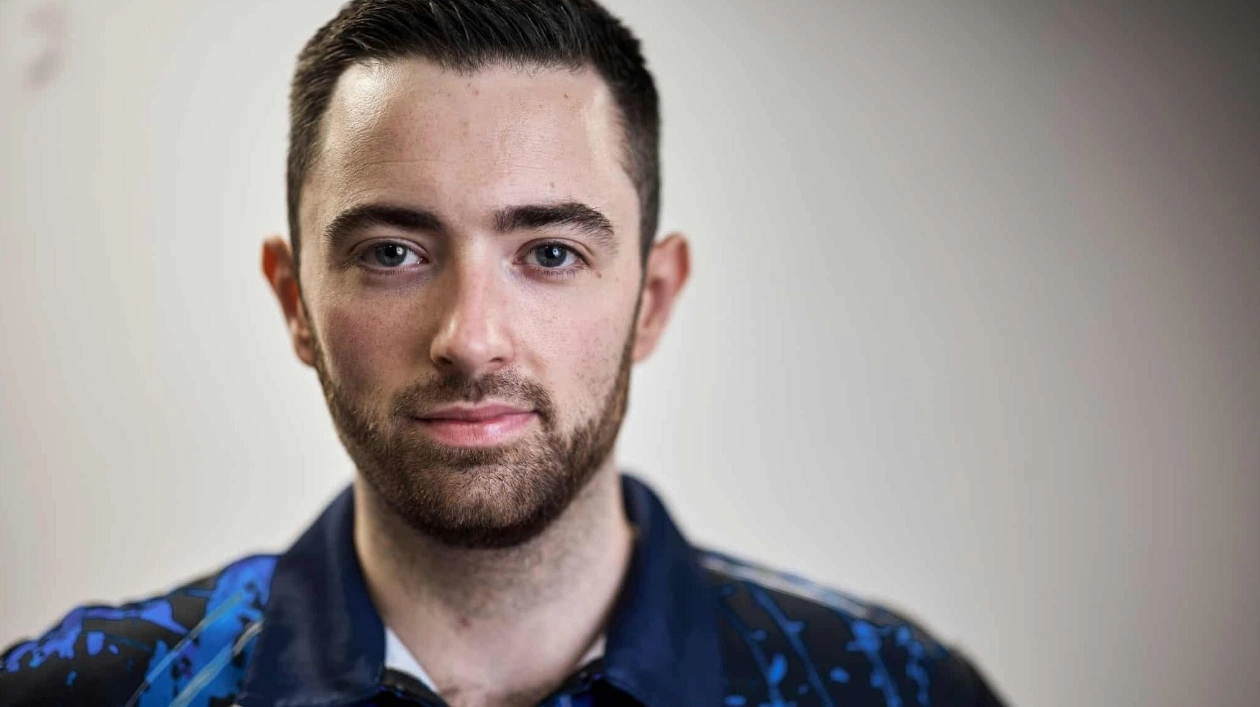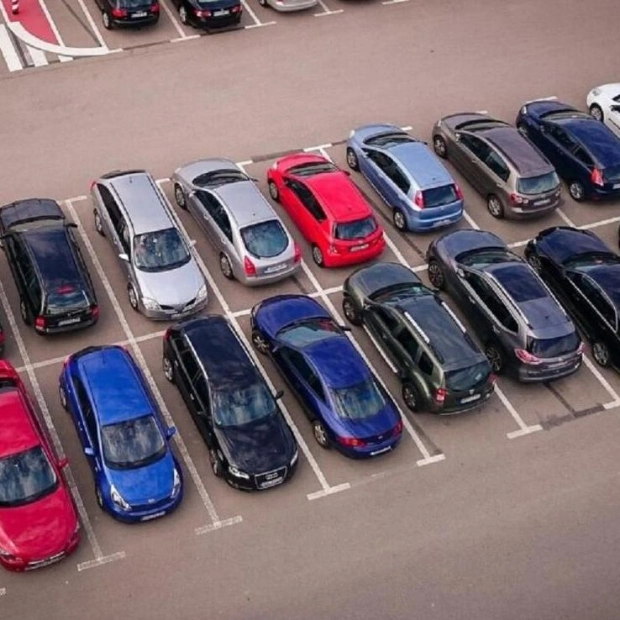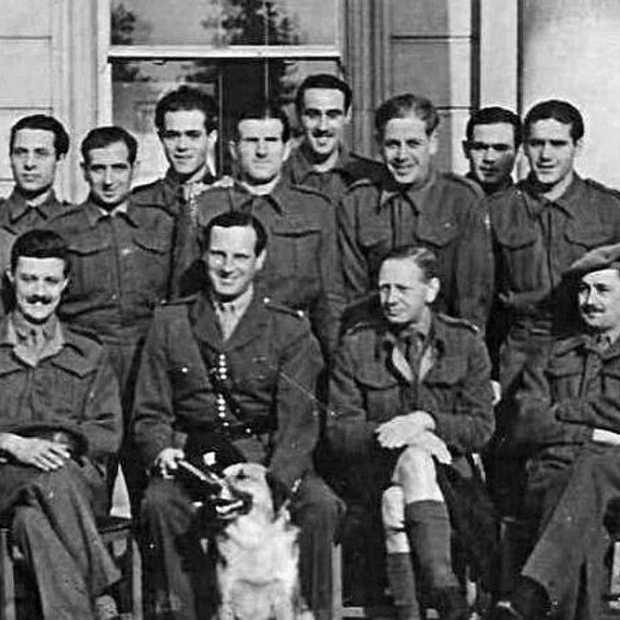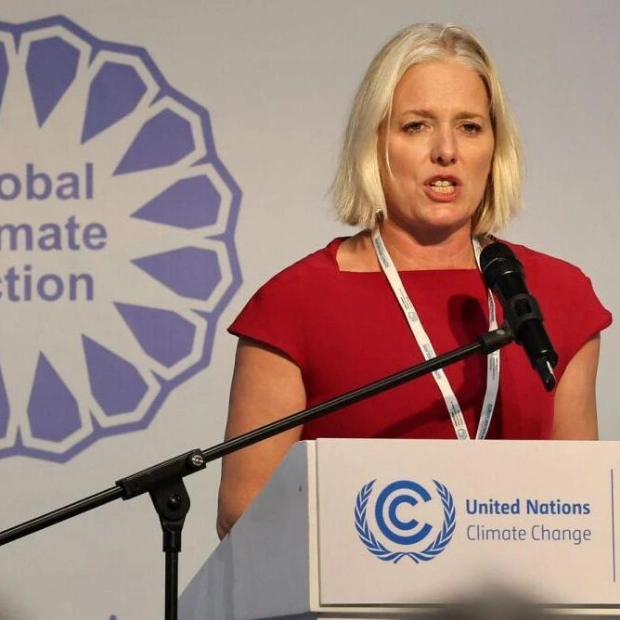“Definitely,” Luke Humphries says when asked if he can defend his darts world championship title, a victory that transformed his life after he defeated Luke Littler in a thrilling final earlier this year. “I truly believe that my moment is now, and I can achieve back-to-back titles. It’s easy to think it, but much harder to do. Yet, I trust in myself, and the second title is always sweeter because it’s more challenging. Winning multiple world championships is where true greatness lies.”
The usually reserved world champion and I sit in a quiet corner of a stylish London bar on the Strand. We’re in the midst of a lengthy interview that was briefly interrupted after 30 minutes, allowing Humphries, Littler, and Michael van Gerwen to film a segment for an upcoming Netflix documentary. The bustling bar has finally thinned out after a busy afternoon launch event for this year’s world championship, which kicks off on Sunday. Humphries, who has been in non-stop conversation, seems relieved to sit down again, free from the glare of cameras and promotional duties.
“I don’t think I’ve ever talked this much in one day,” the 29-year-old admits, embracing the whirlwind of attention that now surrounds the once-derided sport of darts. Everything has changed, and darts, especially at the world championship level, has become a thriving industry. Humphries, whose calm demeanor and meticulous preparation contrast with the sport’s growing hype, shakes his head: “I’ve been talking non-stop for three hours.”
Our interview offers a chance for deeper reflection, allowing Humphries to discuss topics like anxiety, fame, his former life as a roofer, and his intriguing rivalry with the 17-year-old Littler. Bookmakers have Littler as the slight favorite, but Humphries smiles when asked if he considers himself the true favorite. “Of course,” he says. “But every player should believe they are the favorite. I don’t pay much attention to what the bookies say, as they base their odds on statistics and probabilities, which don’t apply to a world championship. I know Luke and I will be close favorites, with Gary [Anderson] and Mike [van Gerwen] a bit behind. But that doesn’t guarantee anything. The player who performs best and most consistently will win the trophy.”
Humphries acknowledges that Littler is currently the world’s best player. However, the reigning champion, who recently defeated Littler in the Players Championship final, might have the stronger mental game. “Statistically, he’s playing the best darts in the world,” Humphries says. “I was in the same position this time last year. At the start of 2024, Michael was playing at his peak. Then it shifted to me, then to Luke, then back to me, and now to Luke. We’re very close right now.”
Van Gerwen, a three-time world champion, has been a dominant force in darts for years, yet Humphries has had the upper hand, winning eight of their last nine matches. “Maybe I’m in better form, and he’s trying too hard to beat me,” Humphries suggests.
Humphries and Littler have faced each other 14 times this year, beginning with their world championship final in January. After losing that match 7-4, Littler won their next six encounters, five of which were decided by a narrow 6-5 margin. Humphries then broke the streak with a 6-5 victory, followed by alternating wins before Littler claimed the Premier League final 11-7. Humphries has since won four of their last five matches, including the last three in a row, but trails Littler 8-6 in their head-to-head record for 2024.
“I enjoy our matches more than any others,” Humphries says. This was evident in the Players Championship final, where he defeated Littler 11-7. “Even up to the semi-finals, I felt a bit flat,” Humphries recalls. “But as soon as I reached the final, I found a surge of energy. It’s hard not to be motivated, and I usually play at a higher level against stronger opponents, which is why I won.”
Humphries admits it was challenging to face Littler in their January world championship final, especially since Littler was only 16 and had captured national attention. “All the pressure was on me, but all the focus was on him,” Humphries says. “He had nothing to lose, so it was a free shot for him in his first pro tournament. I was glad I won because all those people watching saw me lift the trophy.”
When asked how he would have handled the fame as a teenager, Humphries grimaces. “Not as well. It’s overwhelming, with cameras everywhere. For someone his age, it’s incredibly intimidating, but he’s handling it remarkably.”
Humphries feels no envy toward Littler. “He’s more recognized than I am, but that’s fine. I didn’t dream of being famous; I dreamt of being world champion, and I achieved that. I’m older, have a family, and that’s my priority. Right now, he’s young, free, and living the celebrity lifestyle. Good for him.”
Humphries believes Littler is a rare talent, comparing him to Boris Becker. “He shows no fear and performs his best under pressure.” Has Littler changed over the past year? “No, he’s still quite shy and keeps to himself. I try to engage with him more because he’s not yet comfortable in his role. But he’s doing an amazing job.”
Humphries doesn’t try to psychologically unsettle Littler. “I’d rather be friends,” he says. “There’s nothing to dislike about him. He’s calm, down-to-earth, and that’s why our matches have a friendly atmosphere. There’s no animosity; we’re the top two players in darts, and each match between us is an event. We’re not close friends, but we get along well.”
Humphries values his past as a roofer, working for six years before turning pro in 2018. “I’m glad I experienced real life, working hard and getting up early. It makes me appreciate my success even more.” The recent storms in Britain reminded him of those cold winter mornings on the roof. “I miss the camaraderie with my dad, brother, and uncle. The only thing I don’t miss is the cold and the scary moments. I once nearly fell, and if I had hit my head, it could have been disastrous.”
Humphries openly discusses the anxiety that affected him at the start of his pro career. “When panic sets in, you just want to get off the stage,” he says. “I worried my future in the sport was in doubt, but I managed to recover. I still deal with anxiety occasionally, but I’ve learned to control it better. Back then, the anxious feelings drained my mind, creating a spiral effect.”
Humphries experienced heart palpitations and was convinced something was physically wrong. A cardiologist assured him the issue was psychological. “He told me there was nothing wrong with my heart’s electrical activity or valves. Everything was functioning fine. The palpitations were caused by my brain.”
Humphries credits cognitive behavioral therapy for helping him address the root cause of his anxiety. “We discovered that being overweight made me feel anxious around others, as if they were judging me. Losing weight was a turning point in my career and helped reduce my anxiety. It was hard, but I was determined, and it felt easy.”
Humphries doesn’t work with a sports psychologist now. “I don’t want to confuse my brain,” he says. “I’ve trained it to manage anxiety and don’t want to introduce new techniques for darts. I became world champion by being myself, and I should be able to stay there by staying true to myself.”
The last time Humphries dealt with anxiety was during a recent media appearance with Gary Neville and Roy Keane. “They’re superstars, and that made me a bit anxious,” he admits. “I’m a celebrity in darts, but they’re massive sports figures. Those moments are challenging, but it went well. They were kind and polite, and it wasn’t too intimidating. Still, it’s surreal to be in a room with such greatness.”
Humphries’ humility means he’s not a boastful personality. Recognition of his talent came slowly, and he admits to being annoyed when, despite being ranked No 5 last year, he wasn’t invited to join the Premier League. “I was, yeah,” he says with a laugh. “The Premier League is supposed to include the top eight players, but even then, I was overlooked. I’d won four European tour titles and made the latter stages of major tournaments, so I was a bit frustrated. But it worked out for the best. I had a dominant year, bounced back, and finally made my debut this year, reaching the final.”
Humphries, the reigning world champion who carries his No 1 ranking modestly, smiles. “It made me the player I am today, so maybe they were right, and I was wrong at that moment. Everything has worked out well.”
Source link: https://www.theguardian.com






